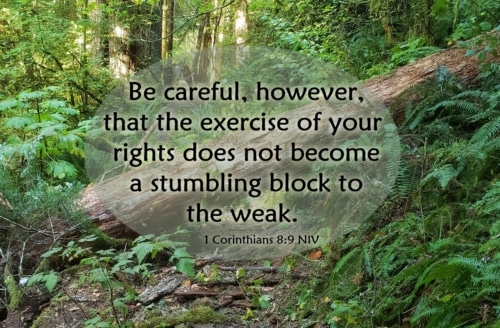Be careful, however, that the exercise of your rights does not become a stumbling block to the weak.
1 Corinthians 8:9 NIV
Should I or shouldn’t I? As a Christian is it OK for me to [fill in the blank]? Sometimes the Scripture is clear, or at least reasonably so. But at other times the Scripture is silent or vague. When the Bible is not clear, how can I know what is OK? As a general rule, at least with these ‘disputable matters’, let your conscience be your guide. If you have any questions about the appropriateness of your action, you should abstain.
But Paul, in this chapter, is more concerned about how my actions impact other believers. I may recognize something as OK and indulge with a clear conscience. But what if another believer, whose conscience is weaker, sees me do that? Might they be encouraged to follow my example? And if they do, they have sinned, not because the action was inherently wrong, but because it violated their conscience. And I bear some responsibility for being a stumbling block in their life.
I do not drink; at all. For two reasons. The first is that I have never developed a taste for alcohol of any kind; it’s just nasty. And the second is because of the example I set for other people. I have absolutely no qualms about a glass of wine with a meal; I could drink it with a clear conscience. But what about the young believer who has doubt about it? If they see me partake, they may also be encouraged to drink. And I then have sinned against them, wounded their conscience, and sinned against Christ (1 Cor. 8:12). Paul ends this chapter with a pledge to not do anything that is going to cause another person to fall into sin. Seems like a good, and loving, pledge to take.

